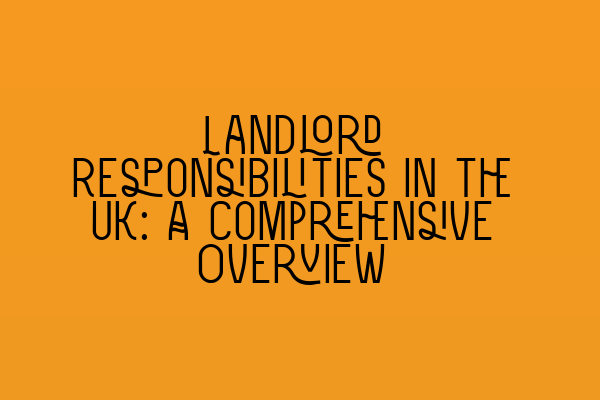Landlord Responsibilities in the UK: A Comprehensive Overview
Welcome to SQE Property Law & Land Law! As experts in property law, we understand the complexities and legal obligations that landlords face in the UK. Whether you are a seasoned landlord or new to the game, it is crucial to have a solid understanding of your responsibilities to ensure a smooth and legal tenancy. In this comprehensive overview, we will delve into the key areas of landlord responsibilities, from safety regulations to tenant rights. So, let’s dive in!
1. Safety and Repairs
One of the primary responsibilities of a landlord is to ensure the safety and habitability of the rental property. This includes complying with various health and safety regulations, such as:
- Gas Safety: Landlords are required by law to have an annual gas safety check conducted by a certified Gas Safe engineer. This check ensures that all gas appliances and installations are safe and in good working order. Failure to comply with these regulations can lead to hefty fines or even imprisonment.
- Electrical Safety: Although there is currently no mandatory legal requirement for annual electrical safety checks, it is highly recommended to ensure the electrical systems in the property are safe. Regular inspections can help prevent potential hazards and keep both the landlord and tenants protected.
- Repair and Maintenance: Landlords have an obligation to keep the property in a good state of repair. This includes addressing any maintenance issues promptly to prevent further damage or inconvenience to the tenants. It is advisable to conduct regular inspections to identify and rectify any repair needs.
For a more detailed understanding of landlord responsibilities in terms of safety and repairs, feel free to check out our article on SQE 1 Practice Exam Questions.
2. Tenancy Agreements
Another important aspect of being a landlord is the creation and management of tenancy agreements. These legally binding documents outline the rights and responsibilities of both the landlord and tenants. Key points to consider when drafting a tenancy agreement include:
- Duration of the Tenancy: Specify whether it is a fixed-term or periodic tenancy.
- Rent Payments: Clearly state the amount of rent, due dates, and acceptable payment methods.
- Deposit Protection: Landlords are required to protect the tenant’s deposit in a government-approved scheme. Failure to do so can result in severe penalties.
- Repairs and Maintenance: Clearly define the landlord’s and tenant’s responsibilities regarding repairs and maintenance.
- Notice Periods: Outline the notice periods required for both parties when terminating the tenancy.
If you are unsure about how to create a robust tenancy agreement, consider engaging the services of a Property Lawyer at SQE Property Law & Land Law.
3. Tenant Rights and Anti-Discrimination Laws
As a landlord, it is crucial to understand and respect the rights of your tenants. Anti-discrimination laws protect tenants from being unfairly treated on the basis of their race, gender, religion, disability, or other characteristics. Some key points to keep in mind include:
- Right to Quiet Enjoyment: Tenants have the right to enjoy their rented property without interference from the landlord. Respect their privacy and avoid unnecessary intrusions.
- Right to Live in a Safe Environment: Ensure that the property is free from hazards and meets all safety requirements.
- Right to Fair Rent: Landlords should not charge excessive rents or increase the rent arbitrarily during a fixed-term tenancy.
- Right to Dignity and Respect: Treat your tenants with respect and dignity, adhering to anti-discrimination laws at all times.
If you are looking to learn more about anti-discrimination laws or tenant rights, our article on SQE 1 Practice Mocks FLK1 FLK2 provides valuable insights.
4. Serving Notices and Eviction
In some instances, landlords may need to serve eviction notices to tenants who have breached their tenancy agreement or failed to pay rent. It is important to follow the correct legal procedures to avoid complications or potential legal action. Some common eviction procedures include:
- Serve a Section 8 Notice: This notice can be issued if the tenant has breached the terms of the tenancy agreement, such as rent arrears or anti-social behavior.
- Serve a Section 21 Notice: This notice is used when the landlord wants to regain possession of the property at the end of the fixed-term tenancy or during a periodic tenancy.
- Apply for a Possession Order: If the tenant does not vacate the property after receiving a valid notice, the landlord may need to apply for a possession order through the courts.
For a more extensive guide on serving notices and eviction procedures, you may find our article on SQE 2 Preparation Courses helpful.
In conclusion, being a landlord comes with a range of legal responsibilities. By understanding and fulfilling these obligations, you can protect both yourself and your tenants. Remember, it is always advisable to seek professional legal advice when in doubt. At SQE Property Law & Land Law, we are here to assist you with any property-related legal matters. If you are interested in gaining more knowledge about SQE exams and preparation, check out our article on SQE 1 Preparation Courses.
Stay tuned for more informative articles from SQE Property Law & Land Law, and don’t forget to keep an eye on the SRA SQE Exam Dates for the latest updates!
